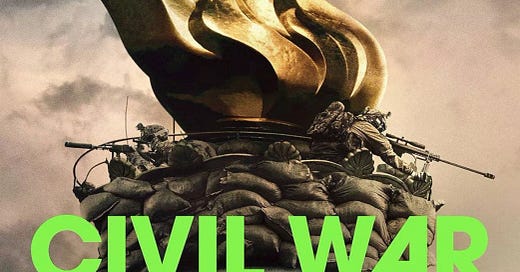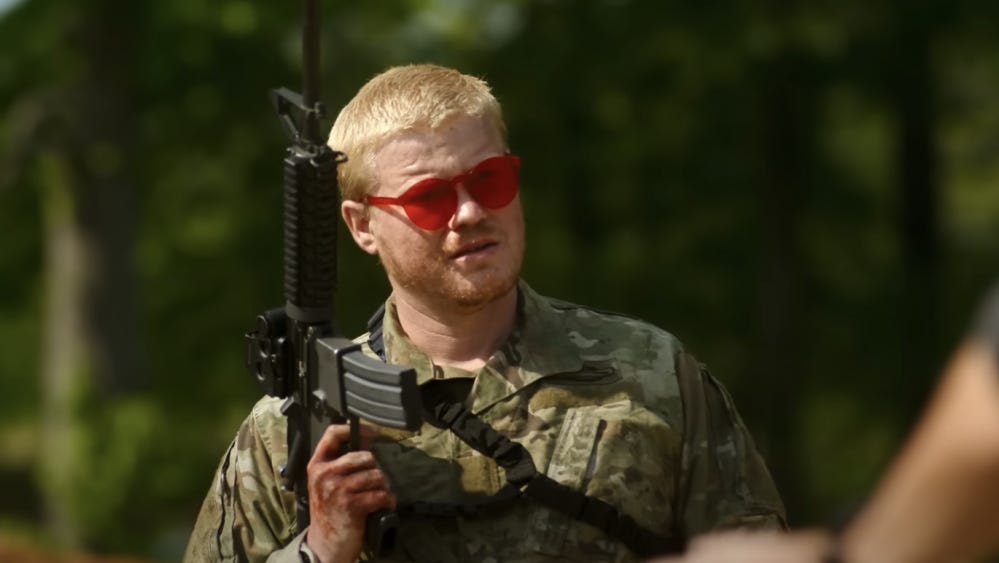Civil War: it's not what you think.
Cryptic, universal, and unlike media depictions of it as a Cassandra-like warning about a 2nd Trump term, Civil War is a road trip tour of atrocity porn and the complicit role played by journalists.
Civil War is a harrowing dystopian parable by a high-concept master, Alex Garland (writer/director of AI classic Ex Machina). The riveting, action-packed film is nothing like media depictions of it as a Cassandra-like warning about a second Trump term. Civil War is a road trip tour of atrocity porn and the complicit role played by photojournalists; an intimate look at the nature of war journalism and who chooses to do it; an expose on the emptiness of almost all war narratives; and a frighteningly realistic take on what a second “American” civil war would resemble. The film's everyday quality and unsettling, often quiet, believability make it eerily compelling.
In interviews, Garland––like the good soldier he must be to get such a film made in today’s TDS-afflicted Hollywood––intimates he is subtly supporting the uni-party’s war on Orange. But Democrats and Republicans expecting to see a work of Woke Leninist propaganda will be surprised. With both parties loosely tossing around rhetorical cannon fodder like “authoritarian,” “dictator,” and “threat to democracy” to caricature the other side, the three-term President the film envisions could be from either party or a new one. Loyalist State soldiers could be wearing the camo of the Western Front (California and Texas). Or they could be from The Florida Alliance (most of the Confederate South) or The New People’s Army Alliance (a motley mix of Midwestern and Northwestern states). Or they could be rogue vigilantes aligned with no side at all. In most civil wars, the sides are sundry, and lines get blurred.
The Pulitzer-chasing reporters around whom the film pivots don’t debate the why of this war. “We record so other people ask,” says war photographer Lee (Kirsten Dunst) to her young, fraught apprentice Jessie (Cailee Spaeny). They mostly want to get “the kill shot” of the putative baddie dead on the ground. As we saw with Romanian tyrant Nicolae Ceaușescu and narco-politico Pablo Escobar—a trimmer Wagner Moura (Joel) returns after his signature performance in Narcos as the Colombian drug kingpin—that kill shot builds the myth upon which future wars can be founded. And so the military-industrial-media river of blood keeps on rolling along.
It helps that Garland is British. He does not get bogged down in the minutiae of America’s political food fight that’s been spilling over into Springer-like ad hominems among the current crop of congressional knuckleheads. His detachment from those particulars makes his mise en scène more cryptic and universal. Garland is not settling scores, as many directors would do with the same material. He’s created a war-torn horrorscape in the vein of Apocalypse Now and The Killing Fields. Though stricken with occasionally tinny dialogue and the cutesy Little Miss Sunshine quality of his band of self-important reporters, it works, forcing key questions: do war correspondents amplify the horror they seek to “capture"?” Would a war even exist if journalists were not there to cover it? At what point, if any, should journalists stop being spectators and take a stand? If, as Susan Sontag posited, photographers are predatory by nature, are we morally complicit in feeding off their grisly art? Should we look? Should anyone?
Despite its winning attributes, what’s deliberately missing in Garland’s apocalyptic travelogue is the prevailing truth in almost every situation. Anti-American, anti-West relativism is in vogue again, though it was proven wrong by various thinkers, from Richard Rorty to Alan Bloom. There is right and wrong. There is a good team and a bad team. There are invariably 50 states of grey, but the sign of a robust and educated republic is the ability to know what is truth and where it resides.
The Nazis were evil. The USA, for all its flaws, was correct in crushing them. The Soviets were evil, too, but not as diabolical as Nazi Germany, so aligning with them made moral and strategic sense. ISIS is a sinister, depraved, and theocratic terror group. Trump was right to crush them. Hamas is wicked, too, and on October 7 (and before), they engaged in terrorist attacks that resembled ISIS in their sick, crude brutality.
However, contrary to the Israeli war cabinet and what might seem like a naive distinction without a difference, Hamas is not precisely ISIS. It seeks a conventional state––albeit by terminating Israel––and a seat at the United Nations. ISIS seeks a transnational caliphate and to violently “convert” other nations to its messianic worldview. It does not seek to be a member of the UN. It seeks to annihilate the UN.
Israel is within its rights to crush Hamas and must take full and immediate action to finish the job. But at some point, there will be a Palestinian state. And like it or not, former members of Hamas––akin to retired members of the Irish Republican Army (IRA)––will be members of its representative bodies.
In America, Black Lives Matter (BLM) based its arson, terror, and vandalism spree on lies about policing and America. Its members should have been punished for their violence but were not. The failure to do so was morally wrong, enabling the crime and political violence that ensued in the name of “correcting injustice” and “defunding the police.” The January 6 protesters did not fully grasp critical facts about the 2020 election. Though Democrats pushed the boundary of what was legal and ethical in 2020, the J6 overreaction was worse. Still, compared to the far more deadly, violent, and extensive insurrection led by BLM and AntiFa, the J6 lookie-loo-grannie and wacko QAnon sedition seemed de minimis.
Nevertheless, the January 6 protesters rightly received punishment because their attack was on the sovereign. While the far more extensive BLM/Antifa terrorism against persons, police precincts, courthouses, federal buildings, and downtowns should have been punished too, their attacks were not on the federal seat of power and, thus, in a close ethical call, not as evil as the January 6 disruption of Congress.
Each side in a political conflict justifies violence because it believes it owns the truth. But narratives are rarely as clear-cut as combatants believe. The key to being a mature American voter, instead of a deluded one, is smartly navigating the nuances of each side and choosing reason, facts, and civilization every time.
Contrary to the projections of many Democrats and hard-right nutballs––as well as profit-driven media seeking to exploit the fissures––the USA is far from civil war. The campus protests over the War in Gaza, however ignorant of facts and history, indicate that freedom of speech and assembly remain robust. As the eccentrics assembled in Collect Pond Park outside the latest Trump trial prove, The Society of the Spectacle soldiers on.
Though I have experienced unhinged behavior from anti-Trump friends and relatives, it’s not so deranged that a courageous, if un-reciprocated, olive branch––usually by me––can’t tamp it down through friendly, self-effacing dialogue. Humor, however, often fails with hardcore anti-Trumpers. MAGA, by contrast, seems to possess at least a healthy, discourse–saving ability to laugh at itself and its colorful, if controversial, standard-bearer. As long as we are willing to prosecute the destructive and violent political actors on all sides, we should be fine.
However, the relative calm I see in my current Spring Western Channel Check might belie a tectonic shift already underway. Are those Western Forces mingling at the truck stop?
The current abuse of the legal system to take out political opponents is a stain on our republic, as were the 2020 election denials made by Democrats who refused to certify Trump’s 2016 election, let alone attend his inauguration. I question whether it is wise for a country to elect anyone who trucks in election balderdash.
However, I also question whether it is wise to reelect a person who turned the Vice President's office into an influence-peddling operation and deployed intelligence chief lapdogs to interfere in the 2020 election on his behalf. Once again, it’s a close call, but the latter is worse. After all, in the film Civil War, the resistance gets supercharged when the President disbands the FBI.
Without picking sides or assigning blame, Civil War brings all these complexities to consciousness without stating them outright. For that reason alone, it’s must-see cinema.







